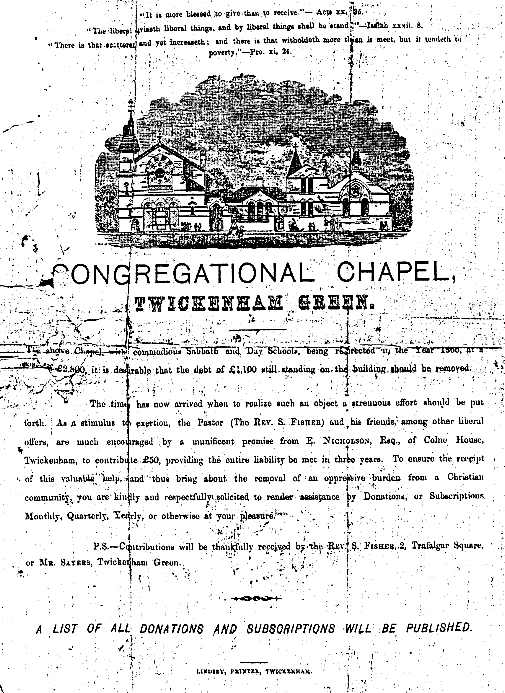Chapel Next the Green (the history of Twickenham Congregational Church) index page
Samuel Fisher, the next minister came to the church in October 1871. He was then aged 42, and had previously ministered at Boxford, Suffolk, and at Boston, Lincs.
A picture of worship at this time has been left by the strolling correspondent of the fledgling Richmond and Twickenham Times. He attended morning service in October 1873 and reported favourably on his visit, concluding: “if they spend in the chapel as pleasant a morning as did the writer of this notice last Sunday, they will be amply repaid for their visit.”
THE DEBT CLEARED

Mr Fisher’s ability extended beyond the pulpit. When he came to the church it was, as Abraham Slade had foreseen, weighed down by debt incurred from the rebuilding, totalling £1100. Clearing this was made a priority, and on May 5th 1874 a thanksgiving meeting was held to commemorate the extinction of the long standing debt. The chairman of the meeting, Mr E.Nicholson of Colne House, had evidently promised £50 subject to the debt being liquidated within three years. Samuel Morley MP had promised a sum of £100 on similar terms.
The chairman “was sure that the greatest amount of praise was due to their minister who seemed to have a call to kill debts“. Mr Fisher had solicited 920 contributions netting £1050. “Many letters had to be written, nearly every house in Twickenham likely to assist was visited and many in Richmond. To the city, suburbs neighbouring towns one hundred and fifty-two journeys were taken. Twenty-five counties were honoured by written and personal appeals and ten long journeys were made in England“. Two Bazaars had yielded a further £205, and collecting cards £59.15.3. In appreciation of the pastor’s efforts a presentation was made to him.
Shortly after this a series of ‘popular entertainments’ was instituted to fund the purchase of an organ but resolve was not so strong this time – in 1877 a replacement harmonium was purchased.
Social concern and controversy
Another concern of Mr Fisher’s was to reduce working hours. Addressing the Annual Meeting of the Wesleyan Sunday School in October 1874 , be suggested that many Sunday School teachers who worked as shop assistants could not prepare their lessons adequately and urged all “to do their best to get the shops closed up at all events not later than eight o’clock up to Friday night – seven if they could – and not later than nine or ten on Saturdays” This idea was subsequently adopted by the town grocers, several of whom were Nonconformists.
Mr Fisher’s address to the 1875 meeting was more controversial:
“The Rev Samuel Fisher addressed the meeting on the necessity for exercising care in the training of children. He said it had been ascertained that out of fourteen hundred young persons who had passed through penitentiaries, thirteen hundred had been Sunday School scholars. Where was the cause of this? He thought it might be traced in great measure to the practice of holding special Sunday services for the children instead of training them up to attend the regular services of the House of God. Children ought to be trained to attend the services they were expected to be at when they grew up to be young men and women. He concluded by addressing the children in suitable manner…“
Those of us who have adopted the postwar notion of a ‘Family Church’ could well find ourselves largely in sympathy with these views, but contemporary reaction was hostile. Several letters were published in the RTT, including one by Mr Fisher, defending and explaining his views.
Whether because of this or otherwise, support for Mr Fisher began to wane. Abraham Slade, who had been elected a deacon in 1872, noted this in his journal:
- Feb.28th 1876: “Have taken sittings at the Baptist Chapel – cannot tolerate Fisher’s conduct (the pastor of the Independent Chapel)“
- Dec.25th 1876: “The past year has been an eventful one the turnout of nearly all the Congregationalists and school over to the Baptists“
By September 1877 Mr Fisher had resigned. Shortly afterwards he accepted the position of Secretary to the School for Sons of Congregational Ministers at Lewisham [now Caterham School] though for some while after he continued to live at ‘The Laurels‘, Belmont Road where his wife ran a day and boarding school for girls.
← George Hunt Jackson, 1865-1871 – – – Disillusion, Dissolution, 1877-1881 →